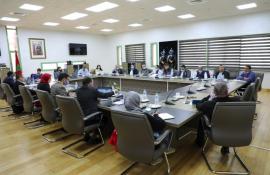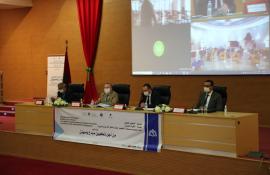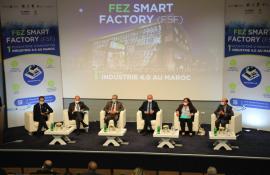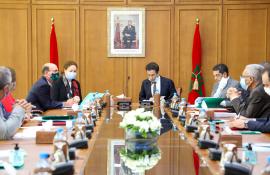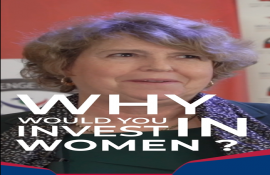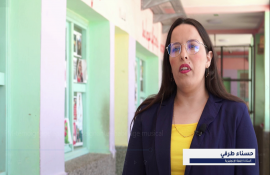The gender and social inclusion approach in Compact II projects
Compact II aims at promoting sustainable and inclusive economic growth and, to this end, pays particular attention to the integration of gender and social inclusion (GIS) dimensions in its various projects.
In accordance with MCC's gender policy and operational guidelines, the MCA-Morocco Agency has adopted a Gender and Social Inclusion Action Plan (PAGIS) that reflects its commitment to promote social inclusion and gender equality at all stages of the design and implementation of Compact II projects. PAGIS considers the results of the analysis of constraints to economic growth that has been carried out by the Government and MCC, in collaboration with the African Development Bank (AfDB). This analysis identified the low quality of human capital and its inadequacy with business needs and the difficult access of investors to land among the major constraints on which it was agreed to act under the Compact II to promote inclusive and poverty-reducing growth. As such, PAGIS defines concrete actions, objectives, and indicators with the aim of ensuring that socio-economic constraints that may affect the full participation of populations and their access to the benefits of Compact II projects are mitigated and that additional opportunities to ensure inclusive participation are identified.
The PAGIS is a reference document for the various structures in charge of the implementation of Compact II (MCA-Morocco Agency, Project Management Units, contractors, and consultants) and their partners, so that they can integrate, in a fluid and transversal way, the gender and social inclusion dimensions, both at the organizational and institutional levels as well as in terms of planning, programming, coordination, monitoring and evaluation.
The PAGIS allows to:
- Define the objectives of the various projects and activities of Compact II in terms of gender and social inclusion.
- Structure planned actions and related timelines, as well as relevant indicators for measuring progress towards the achievement of expected objectives.
The PAGIS was updated in April 2021 in consultation with all stakeholders.
Some examples of how the Gender and Social Inclusion (GSI) approach has been put into practice in Compact II projects
The consideration of gender and social inclusion dimensions in Compact II projects are reflected in the design and implementation of activities integrated into projects in accordance with the PAGIS adopted by the MCA-Morocco Agency. The following actions reflect the realization of this approach:
- Inclusive and gender-sensitive school infrastructure: As part of the rehabilitation of the 90 high schools targeted by Compact II, the Agency carried out a preliminary GSI analysis of all the schools’ facilities (sanitary, accessibility, layout, distribution of common spaces) in relation to their uses by the different users: girls and boys, women and men and people with disabilities. The ongoing rehabilitations will meet the needs of different users and help ensure an effective learning environment for girls, boys and people with disabilities.
- An Integrated School Project (ISP) developed according to an inclusive and gender sensitive process: The ISP is placed at the heart of the new model of improvement of schools targeted by the "Secondary Education" project. In order to take into account the needs and concerns of the entire community, the Agency piloted a process for the development and implementation of ISPs within the project's target schools, which involved various stakeholders inside and outside schools: girls and boys, parents of students (mothers and fathers), teachers, representatives of civil society and the private sector, as well as local authorities.
- Institutionalization of the GSI in the TVET sector: improving the governance and coordination of the integration of GSI dimensions in the TVET sector is one of the main axes of the Agency's support for the operationalization of vocational training reform. To this end, the Agency supports the Department in charge of vocational training in strengthening the institutional and organizational design of the vocational training system in terms of GSI, considering the context and institutional achievements, on the one hand, and lessons learned from international best practices, on the other.
- The "Trophy of Professional Equality": As part of the implementation of the "Employment" activity, the Agency carried out a diagnostic study on gender equity in the workplace in Morocco in close collaboration with the Ministry of Labor and Professional Integration. This work has made it possible to define the outlines of the technical assistance to be provided to the Ministry in order to promote gender equity in the workplace, based on the results of the situational analysis, the best practices at the national and international levels and the needs expressed by the various key actors. Following this, the Agency supports the Ministry in improving the implementation process of the "Trophy of Professional Equality ", an initiative launched since 2016, in order to make it an effective and attractive tool for promoting gender equity and equality in the workplace and to contribute to promote women's access to and retention in the workplace.
- A Gender-Sensitive Melkization procedure: As part of the Melkization project of 66,000 hectares of collective land located in the irrigation areas of Gharb and Haouz, the Agency has set up a communication and awareness-raising plan to inform the entire target population of the project on the implementation process of the ‘Melkization Operation’, while guaranteeing them the right of expression and to be heard. At the same time, women's access to land will be further strengthened through support to registered women on the lists of right holders along the process of ‘melkization’ until the establishment of their land titles.
- Accompanying measures promoting women and youth empowerment: In parallel with the ‘Melkisation Operation’, the Agency will implement accompanying measures to ensure better agricultural development of ‘melkised’ land and guarantee inclusive development of the target population by promoting their qualification and empowerment. These measures include facilitating access to finance, strengthening the technical and business skills of farmers, and developing income- and employment-generating activities, particularly for women and youth.
Sustainable and inclusive industrial zones: Through the creation and rehabilitation of three pilot industrial zones and the improvement of the governance and economic, social and environmental sustainability of the industrial zones financed by the Sustainable Industrial Zones Fund (FONZID), the Agency encourages initiatives promoting the establishment of an environment adapted to the concerns of companies and their employees (women and men) and offering a favorable social infrastructure and favorable working conditions in order to keep women and vulnerable populations in these industrial zones.




